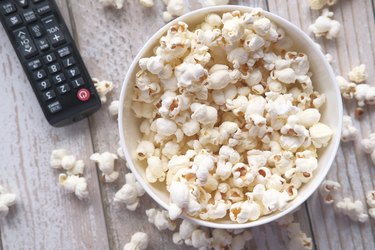
Popcorn is high on the list of America's favorite snacks, with a total of 15 billion quarts — that's 60 billion cups — of popcorn consumed annually. But does choosing air popped popcorn over oil popped make a huge difference in the popcorn's nutritional profile?
When it comes to calories, not really; but cooking the popcorn in oil does alter the fat content pretty significantly. That doesn't mean that you need to stay away from oil popped corn, though. If you choose your oil wisely, it actually provides healthy fats that are an essential part of a balanced diet.
Video of the Day
Video of the Day
Air vs. Oil Popcorn Calories
When it comes to calories, there's really not a huge difference between air popped popcorn and popcorn that's cooked in oil. According to the USDA, air popped popcorn contains 31 calories per cup, while each cup of oil popped popcorn clocks in at 41 calories. If you stick to the recommended serving of size of 2 cups popped, that's only a total difference of 20 calories, which is negligible in the grand scheme of things.
The major difference between air and oil popped popcorn is the fat content. As the name suggests, air popped popcorn is made using only hot air and no added fat, while oil popped popcorn is cooked on the stovetop with a bit of added oil. Popcorn that's been air popped contains 0.4 grams of total fat per cup, while a cup of oil popped popcorn provides 2.3 grams of fat per cup.
Keep in mind that if you add butter to the cooked plain popcorn, calories and fat change pretty significantly. Each tablespoon of butter you add will contribute 102 calories and 11.5 grams of total fat.
Read more: How Healthy is Popcorn?
Choose Your Fat Wisely
But just because air popped popcorn is lower in fat doesn't necessarily mean it's automatically the better choice. While fats were once feared due to the low-fat craze, they're gaining some traction as a key component of a healthy diet. According to Columbia University, fats act as a carrier for the fat-soluble vitamins (vitamins A, D, E and K), make up a major component of every cell in your body and help cushion and protect your vital organs.
Of course, it's all about the types (and amounts) of the fats you use to pop your corn. The Cleveland Clinic recommends choosing olive oil, avocado oil or walnut oil. These types of oils provide healthy, monounsaturated fats that can contribute to good heart health, improve the function of your blood vessels and help balance your blood sugar and insulin levels, according to the Mayo Clinic.
Read more: 12 Ways to Make Popcorn More Exciting
Avoid Microwave Popcorn
While air popped popcorn and popcorn cooked in healthy oil are both good choices, Cleveland Clinic recommends avoiding microwave popcorn as much as possible. Microwave popcorn often contains artificial flavorings and way too much salt. It's also common to overdo it on the portion sizes; there's typically about three servings in one bag, but it's really easy to down the whole bag in one sitting.
The microwave-safe bags that hold microwave popcorn also contain questionable chemicals called PFOAs and PFOSs. These chemicals, which are the same ones used in Teflon nonstick coating, have been linked to several types of cancer and hormonal disruption, especially of the thyroid, according to the Breast Cancer Prevention Partners.
But do those chemicals from the bags actually make their way into the popcorn? According to an October 2019 report in Environmental Health Perspectives, the answer is yes. Researchers from the report pointed out that people who ate a lot of microwave popcorn had higher blood levels of both PFOA and PFOS. That's why it's a better choice to make your popcorn at home, whether you decide to use air or oil.
- USDA: "Butter, Stick, Salted"
- Environmental Health Perspectives: "Dietary Habits Related to Food Packaging and Population Exposure to PFASs"
- Breast Cancer Prevention Partners: "Perfluorooactanoic Acid (PFOA) & Other PFAS Chemicals"
- Mayo Clinic: "What Are MUFAs, and Should I Include Them in My Diet?"
- Popcorn Board: "Industry Facts"
- Columbia University: "Air Popped Popcorn as Part of a No-Fat Diet"
- Cleveland Clinic: "9 Best Tips to Help You Make Healthier Popcorn"
- USDA: "Snacks, Popcorn, Air-Popped"
- USDA: "Popcorn, Popped in Oil, Unsalted"